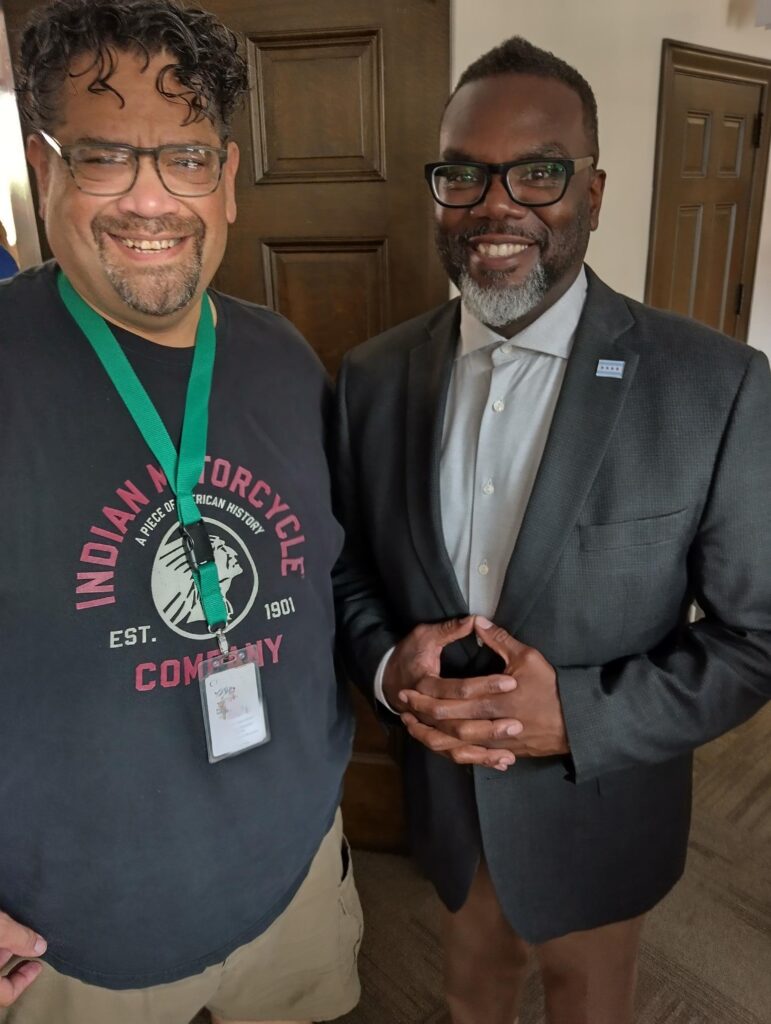Blog
A Harm Reduction Model: Shattering the Stigma of Recovery

At the crossroads of recovery and advocacy stands Patrick “Pepper” Geiersbach, C4’s Harm Reduction Supervisor for the Substance Use and Recovery Department. His mission? To meet people where they are, both figuratively and literally, as he navigates the diverse neighborhoods of Chicago, spreading hope, education, and support to those grappling with substance use disorders.
A Personal Path to Purpose
Pepper’s journey into the world of harm reduction and recovery is deeply personal. Having struggled with severe mental illness and substance use disorder himself, he understands the complexities of recovery firsthand. “I found that doing what I did prior to coming into recovery was not sustainable anymore for a healthy lifestyle,” Pepper shares. His return to recovery brought not just a renewed sense of purpose, but also the realization that joy and serenity could be found in intentional work—work that serves others, rather than just earning a paycheck.
Bridging the Gap: Harm Reduction in Action
At C4, Pepper’s role goes beyond the typical scope of outreach. He’s on the front lines, engaging face-to-face with people in need, whether they’re on the streets or in the community. His approach to harm reduction is rooted in patience and understanding, recognizing that recovery is not a one-size-fits-all process. “You have to earn the right to be heard,” Pepper emphasizes. “Normally, it’s a matter of me doing what I say I’m going to do, and then being able to see it through.”
Pepper’s work covers a vast geographical area, from Foster Avenue in the north to 26th Street in the south, and from the western suburbs to the shores of Lake Michigan. The diversity of neighborhoods he serves reflects the diversity of needs he encounters. Each interaction is an opportunity to build trust and offer tailored support, whether through education, harm reduction strategies, or connecting individuals with C4’s broad range of services.
Shattering the Stigma of Recovery
One of Pepper’s biggest challenges is combating the stigma that surrounds substance use and recovery. “The stigma behind recovery is interesting because we hang this badge of dishonor on it, but it’s never really earned,” he notes. Pepper draws an intriguing parallel between recovery and dieting, pointing out that while both have low success rates, society doesn’t shame those who struggle with dieting in the same way it does those in recovery.
This stigma, according to Pepper, often stems from a misunderstanding of addiction as a moral failing rather than a disease. Through his work, he strives to shift this perception, advocating for a more compassionate and informed approach to recovery. “It’s a matter of the whole community working to try to help the whole community,” he says, highlighting the importance of collaboration among various organizations and networks.
Meeting People Where They Are
Pepper’s philosophy is simple but profound: meet people where they are, and help them manage their lives just a little better than before. This might involve teaching basic wound care to someone who isn’t ready to stop using, or simply having a conversation about harm reduction strategies. For Pepper, success isn’t always about immediate sobriety; it’s about reducing harm and helping individuals take the steps they’re ready for, in their own time.
“It’s difficult because everybody wants them to immediately stop,” Pepper acknowledges. “If they eventually get to that point, great, but it may take time.” His approach is one of patience and persistence, understanding that each person’s journey is unique and that even small steps toward health and safety are victories in their own right.
A Lasting Impact
Pepper’s work is a testament to the power of personal experience and the impact of meeting people where they are—both in location and in life. His dedication to harm reduction and recovery at C4 is not just about saving lives; it’s about earning the right to be heard, fostering trust, and walking alongside those who need it most, every step of the way.
As Pepper continues his journey, one thing remains clear: his work is an inspiration for countless individuals across Chicago, proving that recovery is possible, and that there is always someone willing to listen, to help, and to believe in the possibility of change.



